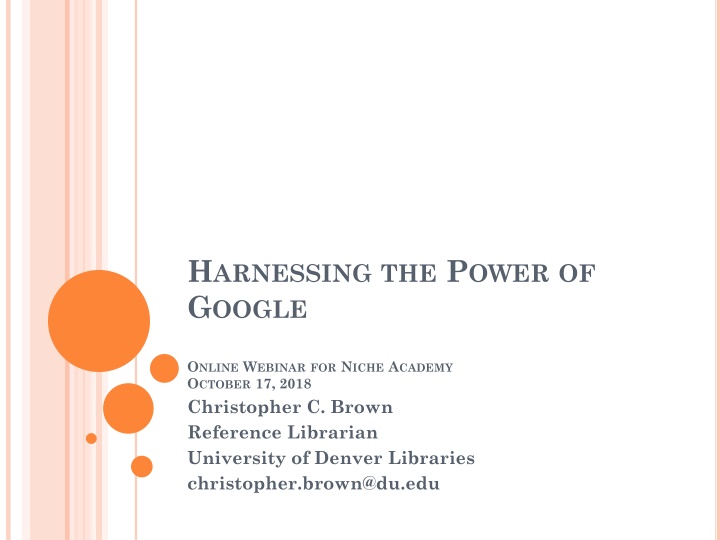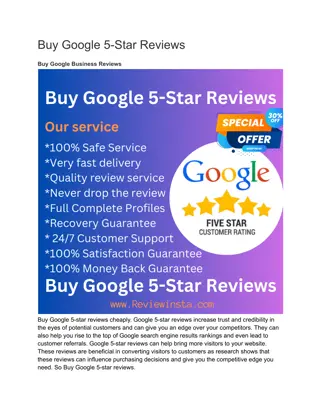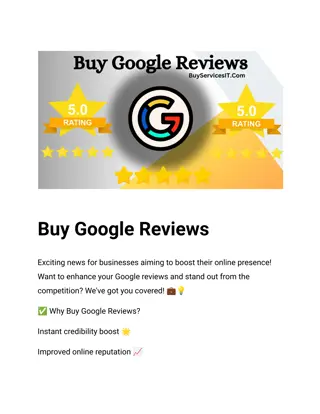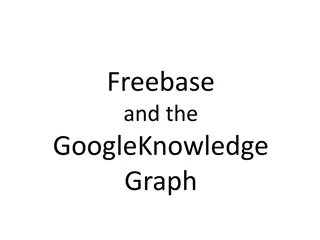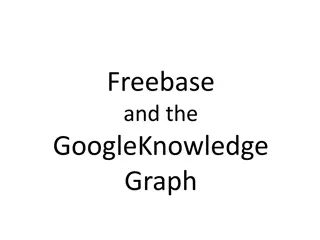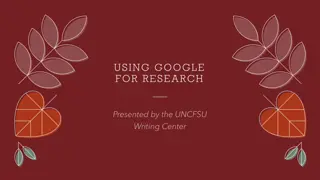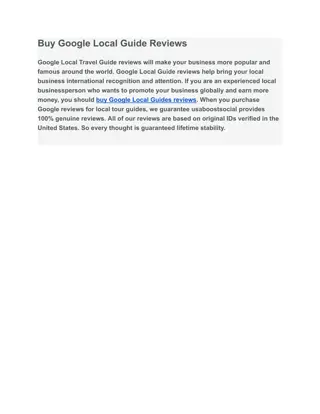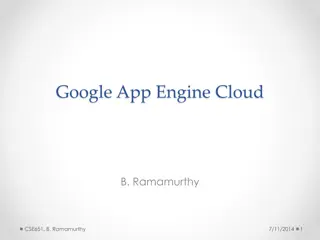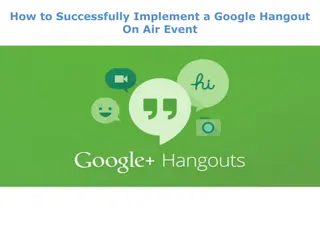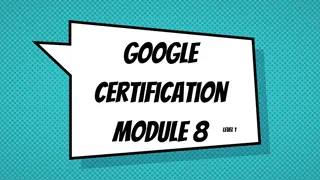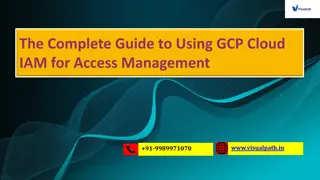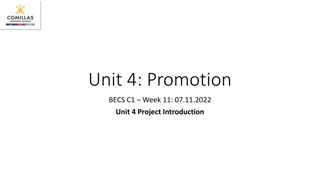Unleashing the Potential of Google: Online Webinar Insights
Explore the diverse functionalities of Google for academic purposes in this comprehensive online webinar led by Christopher C. Brown. Discover strategies for leveraging Google Web effectively, utilizing top-level domains, accessing Google Scholar's rich content, and understanding the features of Google Books. Gain insights into navigating the complexities of Google's various components to enhance your research capabilities.
Download Presentation

Please find below an Image/Link to download the presentation.
The content on the website is provided AS IS for your information and personal use only. It may not be sold, licensed, or shared on other websites without obtaining consent from the author.If you encounter any issues during the download, it is possible that the publisher has removed the file from their server.
You are allowed to download the files provided on this website for personal or commercial use, subject to the condition that they are used lawfully. All files are the property of their respective owners.
The content on the website is provided AS IS for your information and personal use only. It may not be sold, licensed, or shared on other websites without obtaining consent from the author.
E N D
Presentation Transcript
HARNESSING THE POWER OF GOOGLE ONLINE WEBINAR FOR NICHE ACADEMY OCTOBER 17, 2018 Christopher C. Brown Reference Librarian University of Denver Libraries christopher.brown@du.edu
OVERVIEW OF THE THREE GOOGLES OVERLAPPING AT TIMES GS GW GB Note: this chart does not represent the actual Google architecture. It shows that different features are foregrounded in different environments.
GOOGLE WEB: HOWTOLEVERAGEITFOR ACADEMICPURPOSES Primary source materials (government documents, international materials, technical reports, company policies, etc.) Locating these with site-specific searching (domain searching; TLD searching) Examples: site:gov.ng domestic staffing site:state.gov country reports human rights site:undp.org development indicators climate change site:state.co.us marijuana regulation filetype:pdf site:gob.mx water statistics filetype:pdf
TLDS: TOP-LEVEL DOMAINS Google Web is most effectively searched when you can restrict searching to a top-level domain (like .edu, .gov, .jp) To discover all the TLDs for countries, type TLD in a Google search box.
GOOGLE SCHOLAR CONTENT Publisher-supplied indexing and full text content GS Library-supplied journal holdings. Every online journal subscription from every publisher and aggregator
WHATSIN GOOGLE SCHOLAR? Google isn t saying so they leave it up to us to figure it out. http://libguides.du.edu/content.php?pid=86031&sid=639860
GOOGLE BOOKS: BACKGROUND Google Scholar is a metadata and full text search project Where do books come from? Partner Program publishers and authors make their works more discoverable Library Project
GOOGLE BOOKS VIEWS Full View if in public domain may be able to download PDF Limited Preview publisher has given permission for preview of up to 20% or work Snippet View shows a few snippets that match search terms No Preview only basic information; sometimes not able to search full text From:http://books.google.com/intl/en/googlebooks/library/
GOOGLE BOOKSAND HATHITRUST http://books.google.com/intl/en/googlebooks/about/history.html http://www.hathitrust.org/partnership There are materials that are in GB that are not in HT, and vice versa GB HT
SOMETIMES EASIERTOUSE HT THAN GB Annual Report on Introduction of Domestic Reindeer Into Alaska
FEATURE DIFFERENCES Google Web Very little useable metadata Google Scholar Extensive metadata provided by publishers Citations can be displayed (APA, MLA, Chicago) and exported Links to subscribed library content Google Books Extensive metadata provided by OCLC Export citations only in selected formats Metadata Citations No ability to cite resources Links Links to Web content Links to library holdings and bookstore sales Limit by century or custom date range Date Limits Date limits for compliant Web pages Facets for date limits
THE THREE GOOGLES: SUMMARY Academic, scholarly journal articles Discovery + Fulfillment Primary source materials Discovery + Fulfillment GS GW GB Full text of books Discovery Only
THE INFORMATION ACCESS ANOMALY Journal Article (average) Google (Scholar/Books) Book (average) Typical Length - full text (FT) 200 pages x 400 = 80,000 words 15 pages x 400 = 6,000 words Surrogate Record (SR) SR to FT ratio 50-100 words (75 ave.) 1 to 10,666 300-500 words (400 ave. 1) 1 to 15 1 to 1 1http://www.writersservices.com/wps/p_word_count.htm
RECOMMENDED READING Brown, Christopher C. Harnessing the power of Google: What every researcher should know. ABC-CLIO, 2017. Discount Code from ABC-Clio: Q41820 20% discount valid through end of 2018
QUESTIONS? Contact Chris Brown: Christopher.Brown@du.edu
